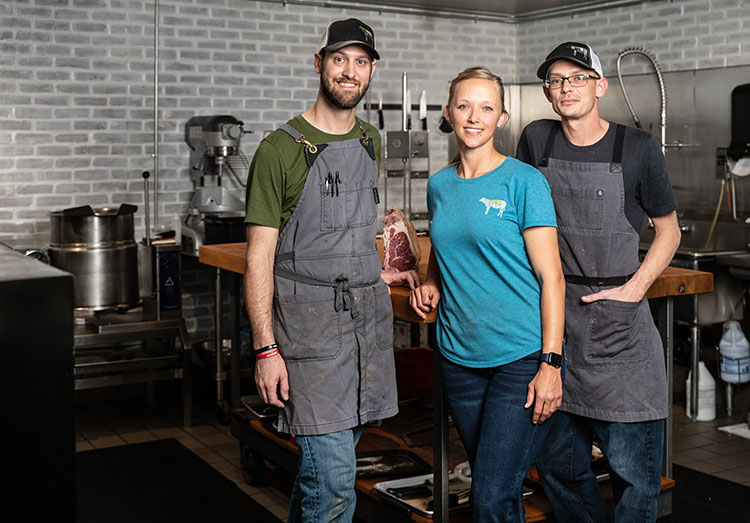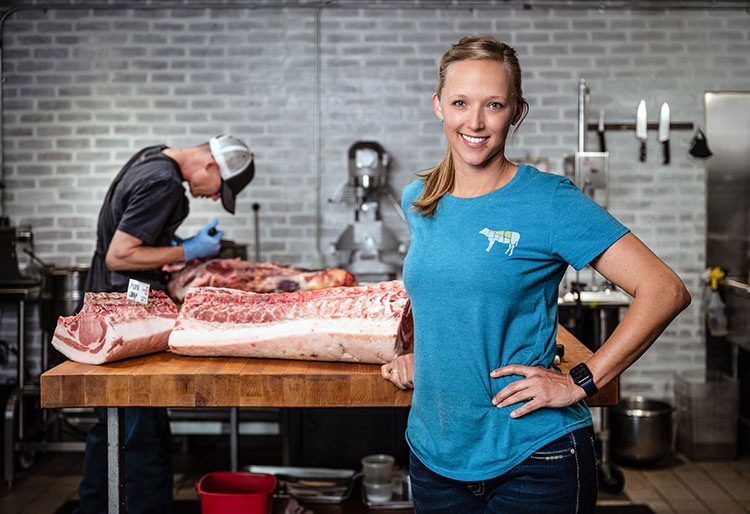Writer Shannon Severson
Photography by Carl Schultz
[dropcap]T[/dropcap]he notion of every town having a butcher, a baker and a candlestick maker is memorialized in a 14th-century children’s nursery rhyme. But with the boom in big-box, one-stop shops, it may seem a quaint relic of the past. While every business fills a need, there are things we’ve lost in exchange for convenience: quality and a personal connection to both where our food comes from and the purveyors of those products.
A new appreciation for keeping it local means there are still small businesses keeping traditions alive right here in the Valley. As the pandemic has shifted the spotlight to mom-and-pop shops, communities realize how important it is to patronize the places where “everybody knows your name.”
At The Meat Market in Carefree, owner Roni Terry operates her custom butcher shop offering premium meats and eggs sourced from whole animals raised by small family farmers, predominantly in Arizona.
The challenges of the COVID-19 pandemic became a boon for her business. Meat shortages during the early days of the crisis introduced an entirely new customer base who realized the difference in quality and service. Demand in March 2020 was up 400% from the previous year. Customers were constantly lined up out the door.
“We made a lot of new friends and people started to realize the quality difference,” Terry says. “Our team never complained and gave it their all, working 18-hour days. We delivered to people’s homes when they were quarantined. That’s what you get with a small business. We were able to do that.”
Those satisfied customers have been coming back ever since, adding to steady growth since The Meat Market’s doors opened in 2016.
Everything is Personal
The idea of The Meat Market came before Terry had ever met a butcher or sourced the products. But it became her dream after over a decade of working in the culinary industry with such luminaries as Thomas Keller and Hugh Atcheson.
“It took a long time to find our farmer, Josh Koehn,” Terry says. “I wanted someone who would raise animals for meat just as I would. I’m an animal lover, but I’m also a carnivore. I wanted to keep my sources in-state as much as possible and he was the only one I found back in 2015 who did things the right way. He operates with integrity and transparency; that’s how I work and how my team works.
We try to keep it small at every level. There is no corporate hierarchy. From raising the animals to walking out the door with a paper-wrapped package, everything is personal.”
Terry adds that, just like people, animals hold their stress in their muscles. Stressed animals don’t feel good and ultimately don’t taste good. Humanely raised and processed animals don’t just taste better, they’re also more nutritious and more satiating. Fresh meat even takes less time to cook.
Koehn’s Chiricahua Pasture Raised Meats is a small family farm in the high desert Sulfur Springs Valley. It’s part of the Kansas Settlement in Cochise County, a Mennonite community with longstanding agricultural traditions and a history of being able to irrigate and enrich even the poorest soils.
“Farmer Josh raises his animals on irrigated pasture,” Terry explains. “It’s nutrient-dense soil. I am not alone in this industry when I say that I’d like to see people eat meat less often. If you’re eating better meat, you won’t need to eat it three times a day, seven days a week. That would make a substantial, positive impact on our family farms.
“If you’re buying inexpensive meat, it’s likely you are not supporting the small American farmer. Farmers like Josh are rare and disappearing. When the big guys are processing millions of cows a day, there is little to no quality control.”



Total Transparency
Quality is what The Meat Market is all about. Inside her shop next to Brix Wines, expert butcher Josh Anderson fills custom orders, wraps them up in white butcher paper and labels them with the family names of folks who will come in to pick up a juicy steak for the grill or chops for the stovetop. These custom pre-orders make up nearly 40% of the shop’s business.
Chef Dale Flores cooks up a selection of ready-to-eat menu items like grass-fed ground beef taco meat, bone broth, smoked pork green chili and take-and-bake veal mushroom meatloaf with pork belly. The shop also carries locally sourced and produced items like bread, pasta, tortillas and sauces.
There’s a small case with handmade sausages and roasts, but no rows of plastic-wrapped meat in styrofoam trays. Aside from pre-orders, the butchers still know what their regular customers want. Sometimes a car pulls into the lot and the team instantly goes to work prepping “the usual.”
Everything is cut to order by hand — no bandsaws, which tear through the meat and create more waste. Even the excess product is packed and sold as raw pet food. It’s exhausting, physical work that requires a great deal of skill. Anderson often has an audience. There’s a television screen that broadcasts a view of what’s on the block at that moment — it’s just one way that Terry maintains total transparency.
“There are a lot of dark parts of our industry,” she says. “We want to be open about birthing, raising, processing, shipping and preparation. You can see straight into our walk-in refrigerator. We want people to see exactly how our meat is kept. It’s all visible and that has always been a big thing for us — it’s something we will never change.”
Terry’s heritage breed pork is a type that is so pink, some mistake it for beef. And it’s so fresh and safe that she has patrons who order it as pork tartare.
In order to have enough of the popular cuts her customers order, Terry brings in prime beef from farms throughout the Midwest and pasture-raised veal from Rosotti Ranch — a small family farm in Petaluma, California.
“At first, I only offered 100% grass-fed and finished beef but a whole animal only has 16 rib eyes,” she says. “We would sell out and I would keep having to turn away customers. The prime beef we bring in is the top 1% of the entire country’s best beef, but our prices are on par with the lower two-thirds prime sold by high-end local grocery chains. We really have items for every budget.”
Southern Hospitality
Terry grew up in Las Vegas and her story has always involved animals and food. A talented barrel racer, there’s never been a time when she didn’t own horses. She got her start in the culinary industry at Keller’s Bouchon Restaurant in the Venetian Hotel while working on her degree in restaurant hospitality management at University of Nevada, Las Vegas.
“I started in the pastry kitchen at Bouchon, but I was a little too chatty for a Thomas Keller kitchen,” Terry recalls, laughing. “When I was 21, I was moved to the bar. When Bouchon Bakery opened, my chattiness paid off; I was chosen to help open the bakery as a chef supervisor. I was good at selling and I knew how a bakery worked because of my time in the pastry kitchen.”
When Terry moved to Atlanta to work at Atcheson’s Empire State South with chef Ryan Smith, her goal was to learn all she could about southern hospitality. But what she also gained became the foundation of The Meat Market.
“Ryan was the most talented chef I’ve ever worked with,” she says. “He would source whole animals. A farmer would come in with a whole lamb over his shoulder and they would change the menu daily based on what was fresh. Every part of the animal was used to make entrees, charcuterie and stocks.”
A longing for more work-life balance prompted Terry’s move to Arizona. While working at a Cave Creek restaurant, she noticed more patrons asking educated questions about the sourcing of their food. She saw that there was a market for higher quality, more sustainably sourced meat products than what’s available at the typical grocery store.
Then the space next to Brix Wines opened up and it was time to make the leap. Her boyfriend, Brian Schank — who just happens to be the grandson of a butcher — helped her with the build-out.
Terry has never advertised but word of mouth has kept the shop constantly busy. When she does find some extra time to spend on her small ranch, she and her boyfriend care for their menagerie of five horses, four dogs and pet Corriente cow named Moo-ria.
“She’s a pet-able, not edible cow,” Terry says. “Her job is to roam around and eat all the weeds. She’s funny and has a great personality.”
Terry and her team’s hard work continues to be rewarded with a steady stream of customers who enjoy both the typical butcher shop items and learning something new from The Meat Market’s collection of recipes.
“That’s where my background in hospitality comes in,” Terry says. “I want people to feel comfortable asking questions. We aren’t pretentious and we like introducing people to new information and recipes. Food should be fun, not intimidating. At the end of the day, we want people to love what they bring home and come back for it again and again.”







Comments by Admin